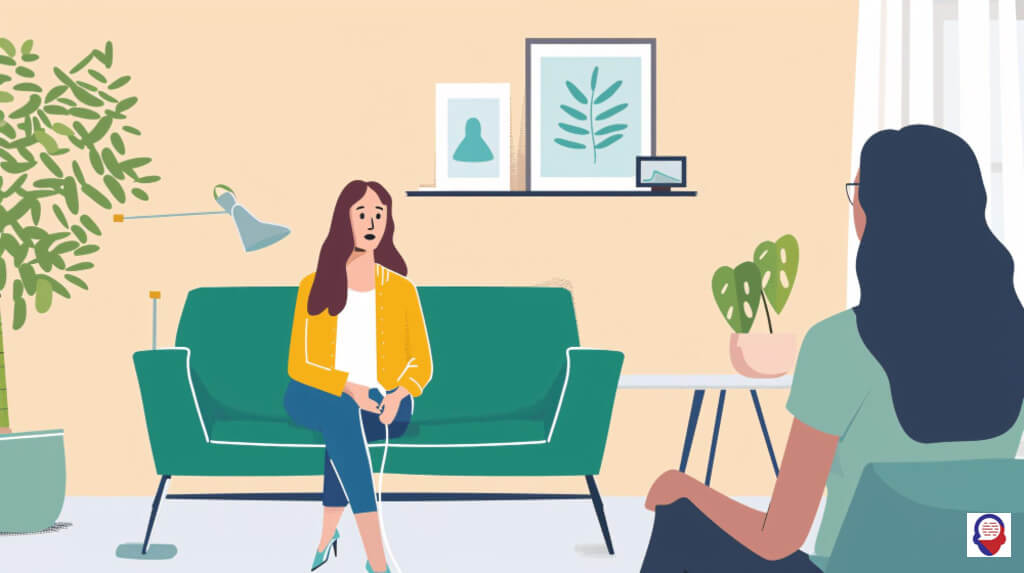Find Your Freedom: A Guide to OCD Therapy
Obsessive Compulsive Disorder can feel like being trapped in a prison of your own mind. It’s a relentless cycle of distressing thoughts and overwhelming urges to perform repetitive actions, a cycle that can shrink your world until it feels impossibly small. You might feel isolated, misunderstood, and exhausted by the constant battle. But there is a well-trodden path out of that prison, and it begins with understanding that effective, compassionate help is not just a possibility, it is a reality. This guide is your first step on that path, illuminating the way forward through professional counselling.

What Exactly Is Obsessive Compulsive Disorder?
Obsessive Compulsive Disorder, or OCD, is a serious mental health condition characterised by two core components, obsessions and compulsions, which feed into a distressing and time consuming cycle. It is not a personality quirk or a preference for tidiness, but a neurobiological disorder that causes significant impairment in a person’s life.
Obsessions are the intrusive part of the equation. They are unwanted, recurring, and persistent thoughts, images, or urges that are deeply distressing and cause intense anxiety. These are not simple worries, they often feel sticky, alien, and completely contrary to a person’s true values or character. Common themes include fears of contamination, worries about causing harm, a need for symmetry, or intrusive thoughts of a violent or taboo nature.
Compulsions are the response to that intense anxiety. They are repetitive behaviours or mental acts that a person feels driven to perform in order to reduce the distress caused by an obsession or to prevent a feared event from happening. These rituals, however, provide only fleeting relief, and they ultimately strengthen the obsession, creating a powerful and vicious loop. A compulsion might be visible, like repeated hand washing, or it could be a hidden mental ritual, like praying or mentally reviewing events over and over again.
The cycle is what defines the disorder. An obsession appears, causing a spike in anxiety or disgust. To neutralise this feeling, the individual engages in a compulsion. The compulsion temporarily lowers the anxiety, which reinforces the brain’s false belief that the ritual was necessary to prevent disaster. This temporary relief ensures that the next time the obsession appears, the urge to perform the compulsion will be even stronger, locking the person ever more tightly into the grip of OCD.

Why Is Professional Counselling So Crucial for OCD?
Professional counselling is crucial because it provides the specialised, evidence-based strategies required to break the powerful cycle of obsessions and compulsions. Unlike other challenges that might be overcome with willpower, OCD actively works against logic and personal resolve, making it nearly impossible to escape without expert guidance.
Trying to fight OCD on your own is like trying to escape quicksand by struggling harder, it only pulls you in deeper. The disorder is counterintuitive. Your instincts scream at you to perform a compulsion to find safety, but it is precisely that action that gives the OCD its power. A trained therapist understands this paradox and can guide you through the counterintuitive steps needed for true recovery.
Furthermore, OCD is an incredibly isolating condition. The nature of the intrusive thoughts can be so shameful or frightening that sufferers are terrified to speak about them, fearing judgement or misunderstanding. A professional counsellor provides a confidential, non-judgmental space where you can share these experiences safely. This therapeutic relationship itself is a powerful antidote to the secrecy and shame that allow OCD to thrive.
Without proper treatment, OCD often gets worse over time. The rituals can become more complex and time consuming, and the obsessions can expand to cover more and more areas of a person’s life. Professional intervention stops this progression and puts you on the path toward reclaiming your time, your relationships, and your peace of mind.

What Are the Most Effective Types of Counselling for OCD?
The most effective and scientifically supported types of counselling for OCD are specific forms of Cognitive Behavioural Therapy (CBT), most notably Exposure and Response Prevention (ERP), and increasingly, Acceptance and Commitment Therapy (ACT). These therapies directly target the mechanisms that keep the disorder going.
While general talk therapy can be helpful for many issues, it is often ineffective for OCD and can sometimes make it worse by inadvertently providing reassurance. The gold standard treatments are active and structured, designed to help you change your behaviour and your relationship with your thoughts. They require courage and commitment, but they have a proven track record of helping people find lasting freedom from OCD.

How Does Exposure and Response Prevention (ERP) Work?
Exposure and Response Prevention, or ERP, is a highly effective therapy that works by systematically helping you face your fears while resisting the urge to perform compulsions. It is considered the frontline psychological treatment for OCD because it directly breaks the cycle that fuels the disorder.
The "exposure" component involves you and your therapist creating a list of your triggers, ranked from least to most anxiety-provoking. You then gradually and repeatedly confront these triggers, starting with something manageable. For someone with contamination fears, this might start with touching a doorknob and then progress over time to touching something they consider more contaminated, like a public handrail.
The "response prevention" part is the crucial other half of the process. During the exposure, you make a conscious and supported decision not to engage in your usual compulsive rituals. You sit with the anxiety and discomfort without washing your hands, checking the lock, or seeking reassurance.
This process achieves two vital things. First, it teaches your brain through direct experience that your feared outcome does not occur, the obsession is a false alarm. Second, you learn that the intense anxiety you feel is temporary and will decrease on its own without the need for a ritual. This is a process called habituation, and it fundamentally rewires the brain’s response to the triggers, stripping the obsessions of their power.

What is Cognitive Behavioural Therapy (CBT) in OCD Treatment?
Cognitive Behavioural Therapy, or CBT, is the broader family of therapies to which ERP belongs, and its cognitive components are also vital in OCD treatment. It works by helping you identify, challenge, and change the distorted patterns of thinking that underlie and support your obsessions.
The cognitive aspect of CBT focuses on the specific interpretations you give to your intrusive thoughts. For example, a person with OCD might believe that having an intrusive thought about harming someone is morally equivalent to actually wanting to do it. This is a cognitive distortion known as "thought-action fusion."
A therapist using CBT would help you examine the evidence for and against these beliefs. They would guide you to see that thoughts are just mental events, not facts or commands. You learn to recognise these cognitive errors and develop more balanced and realistic perspectives, which reduces the distress the thoughts cause and makes it easier to resist compulsions.
CBT helps you untangle your identity from the content of your obsessions. It provides the logical framework and mental tools that support the behavioural work of ERP, creating a comprehensive approach to dismantling the structure of OCD from both the inside and the outside.

Can Acceptance and Commitment Therapy (ACT) Help?
Yes, Acceptance and Commitment Therapy (ACT) can be a powerful and effective approach for OCD, often used alongside or as an alternative to traditional CBT and ERP. ACT helps by teaching you to change your relationship with your distressing thoughts and feelings, rather than trying to eliminate them.
The core idea of ACT is that struggling with and trying to control unwanted thoughts is what gives them power and keeps you stuck. Instead of fighting, ACT encourages acceptance. This doesn’t mean you have to like the thoughts or agree with them, it simply means allowing them to be present without getting entangled in them or letting them dictate your actions.
ACT uses mindfulness techniques to help you "defuse" from your thoughts, meaning you learn to see them as just words or pictures passing through your mind, not as objective truths or urgent commands. You learn to observe your obsessions with a sense of gentle curiosity, which creates a space between you and the thought, reducing its emotional impact.
From this place of acceptance, the therapy then focuses on the "commitment" part, which involves identifying your core values, what truly matters to you in life. You then commit to taking actions that are aligned with these values, even when anxious thoughts are present. This shifts your focus from a life spent fighting anxiety to a life spent building meaning, effectively helping you to live fully alongside OCD, rather than for it.

What Can I Expect From My First OCD Counselling Session?
You can expect your first OCD counselling session to be a collaborative and non-judgemental assessment, where the primary goal is for you and the therapist to get to know each other. The therapist needs to understand your unique experience with OCD, and you need to feel comfortable and confident in their ability to help you.
The session will likely begin with a conversation about what brought you to therapy. The therapist will ask open questions about your symptoms, when they started, and how they impact your daily life. They are not there to judge you, they are there to understand the specific nature of your obsessions and compulsions.
To get a clearer picture, the therapist may use a structured interview or a standardised questionnaire, like the Yale-Brown Obsessive Compulsive Scale (Y-BOCS). This helps to measure the severity of your OCD and provides a baseline to track your progress over time. This is a standard part of the process and helps ensure your treatment is tailored specifically to you.
By the end of the session, you should have a clearer idea of the therapist’s approach, particularly their experience with ERP. It is also a time to begin discussing your goals for therapy. You will not be asked to do anything overwhelmingly difficult on day one, the first step is always about building a safe and trusting therapeutic alliance.

How Do I Find the Right Counsellor for OCD?
Finding the right counsellor for OCD involves looking for a professional who has specific, specialised training and experience in treating the disorder, particularly with ERP. Not all therapists are equipped to treat OCD effectively, so it is vital to find someone with the correct expertise.
The search for the right therapist is one of the most important steps you will take. A good therapeutic fit can make all the difference in your recovery journey. Take your time, ask questions, and trust your instincts when choosing the person you will work with.

What Qualifications Should I Look For?
You should look for a counsellor who is accredited by a recognised professional body, which ensures they meet high standards of training and ethical practice. More importantly, you need to inquire specifically about their experience with OCD.
Do not be afraid to ask direct questions before you even book a session. Ask them what percentage of their practice is dedicated to treating OCD. Ask them to describe their approach to treatment and how they use Exposure and Response Prevention (ERP). An experienced OCD therapist will be happy to answer these questions and will understand why you are asking. A vague answer or an indication that they use "general talk therapy" for OCD is a red flag.

Is the Therapeutic Relationship Important?
Yes, the therapeutic relationship is fundamentally important to the success of your treatment. The trust and rapport you build with your counsellor is the foundation upon which all the therapeutic work, especially the challenging work of ERP, is built.
You need to feel that your therapist is your ally, someone who understands, respects, and supports you without judgement. ERP requires you to be vulnerable and to face your deepest fears, which is only possible if you feel completely safe with the person guiding you. This connection, known as the therapeutic alliance, is one of the strongest predictors of a positive outcome in therapy.
It is perfectly acceptable to speak with a few different therapists before settling on one. Think of it as an interview process where you are finding the right professional partner for this journey. If you don’t feel a connection after a session or two, it is okay to seek someone else who feels like a better fit.

What Challenges Might I Face During OCD Therapy?
The main challenges you might face during OCD therapy include a temporary increase in anxiety as you begin exposures, moments of intense doubt, and the sheer effort it takes to consistently resist compulsions. Therapy for OCD is hard work, but it is work that leads to profound and lasting change.
The entire point of ERP is to intentionally trigger your anxiety in a controlled and systematic way so you can learn to tolerate it. This means that, especially in the beginning, you will feel uncomfortable. It is crucial to remember that this anxiety is productive, it is the feeling of the OCD cycle beginning to break. Your therapist will be there to guide and support you, ensuring you never take on more than you can handle.
OCD is often called "the doubting disease" for a reason. As you make progress, the disorder will fight back. It will whisper doubts in your ear, trying to convince you that the therapy isn’t working, that your fears are actually real, or that you should just do one more ritual to be safe. Recognising this as a trick of the disorder is a key part of the therapeutic process.
Progress is rarely a straight line. You will have breakthrough moments and you will have setbacks. Some days will feel easier than others, and that is a normal part of recovery. The key is to stay committed to the process, celebrate the small victories, and be compassionate with yourself on the harder days. Your therapist is your partner in navigating these challenges, providing encouragement and helping you stay on course.
Frequently Asked Questions

How long does counselling for OCD take?
The duration of counselling for OCD varies significantly from person to person, depending on the severity of the symptoms and the consistency of the work. However, many people see significant improvements within 12 to 20 weekly sessions of focused ERP. The goal is not a quick fix, but to provide you with the skills to become your own therapist so you can manage OCD for the rest of your life.

Is medication necessary alongside counselling?
Medication is not always necessary, but it can be a very helpful component of treatment for many people. A class of antidepressants known as Selective Serotonin Reuptake Inhibitors (SSRIs) are often prescribed for OCD and can reduce the intensity of obsessions and compulsions. For many, the combination of ERP therapy and medication is the most effective approach, as the medication can lower anxiety enough to make the therapy work more accessible. This is a decision to be made in consultation with your GP or a psychiatrist.

Can OCD be completely cured?
While the word "cure" can be misleading, recovery from OCD is absolutely possible. The goal of treatment is to reach a point where OCD no longer controls your decisions or limits your life. You may still have an occasional intrusive thought, but you will have the tools to see it for what it is and not engage with it, allowing it to pass without incident. Successful therapy means managing the condition so effectively that it fades into the background, allowing you to live a full, rich, and meaningful life.

What if my OCD is purely obsessional (Pure O)?
ERP remains the gold standard treatment even for primarily obsessional forms of OCD, often called "Pure O". In these cases, the compulsions are not external behaviours but are hidden mental rituals, such as mental checking, reassurance seeking, or thought neutralisation. The exposures are therefore done imaginally, by purposefully bringing up the feared thought or image and then resisting the urge to perform the mental compulsion. The principle is exactly the same, you are learning to tolerate the thought without engaging in the ritual that reinforces it.
Taking the first step is often the hardest part of any journey. You have already taken it by seeking this information. The path to managing OCD is challenging, but you do not have to walk it alone.
At Counselling-uk, we believe everyone deserves a safe, confidential, and professional space to find support for all of life’s challenges. Our mission is to connect you with compassionate, qualified therapists who can provide the expert guidance you need to reclaim your life from OCD. Reach out today, and let us help you find your way back to yourself.




In reflection, counseling is an important tool for managing symptoms associated with obsessive-compulsive disorder (OCD). It enables those living with OCD to understand the root causes behind their disorder and learn new coping skills that will
Cognitive-Behavioural Therapy for OCD
The third component of DBT, emotion regulation, helps individuals learn how to identify and manage emotions more effectively. This includes recognizing unhelpful thought patterns and teaching people new ways of responding rather than resorting to compulsion or avoidance behaviours when feeling distressed or triggered by something specific. Lastly, interpersonal effectiveness is designed to help people build effective relationships with other people by learning how to assert themselves without fear of rejection or judgement.